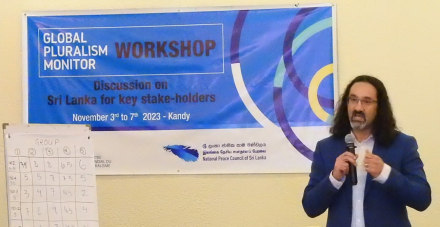The Global Center for Pluralism Canada (GCP) and NPC conducted workshops for NPC staff, Divisional Secretaries (DS) officers and NPC Master Trainers on the Global Pluralism Monitor (GPM) Sri Lanka. The GPM recognises the need to better understand the movement towards, and away from, pluralism in a society through a multidimensional, holistic framework of analysis.
GPM is a tool that assesses the state of pluralism in countries around the world. It uses a framework to measure inclusion and exclusion across political, economic and social dimensions through 20 indicators.
The first workshop for 27 DS officers explored the GPM framework specific to Sri Lanka and concluded with a panel discussion featuring Dr. Chandima Abeysinghe, Dr. Kalpa Rajapaksha, Prof. Fazeeha Azmi and Prof. Neil DeVotta.
“I work in the Dickwella Divisional Secretariat where Sinhala, Muslim and Tamil people live. We work with all the communities. There are no issues now but we have wounds caused by what has been said previously. But we are moving forward. People are united. The politicians want to divide the community for their political gains. I don’t see any divisions in our community; we even have mixed marriages in our communities,” said Dickwella Divisional Secretary, Mr. Susantha Attanayke.
Beruwala Divisional Secretary, Mr. R.P. Perera, stressed the critical role of legislation and a common legal framework in providing basic needs essential for equality and inclusivity.
Both workshops resulted in a deeper understanding of pluralism necessary for an inclusive society and underscored the importance of nurturing a collective identity that transcends religious, regional and political affiliations.
A second meeting with Master Trainers on the GPM framework brought together 32 trainers from 11 districts. The discussion highlighted the challenges regional divisions posed to forming a collective national identity.
Both workshops resulted in a deeper understanding of pluralism necessary for an inclusive society and underscored the importance of nurturing a collective Sri Lankan identity that transcends religious, regional and political affiliations.

